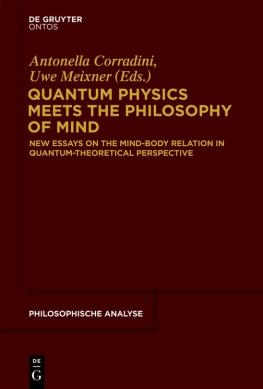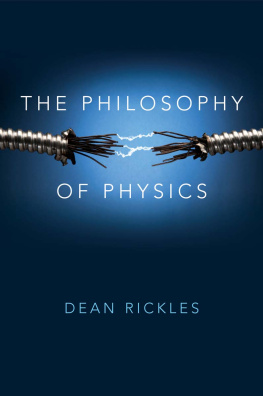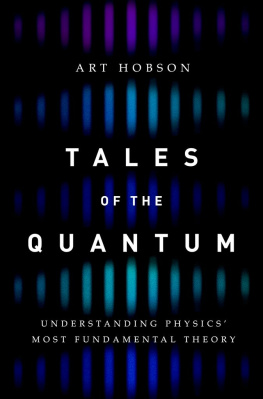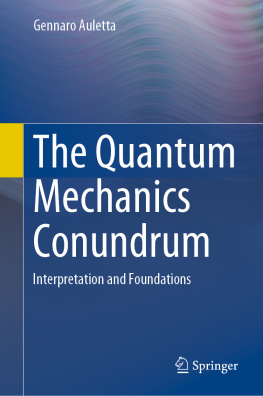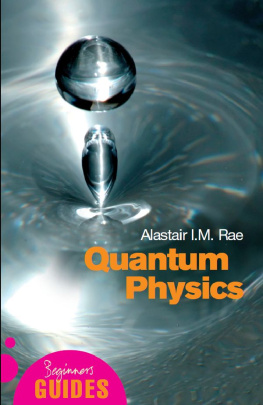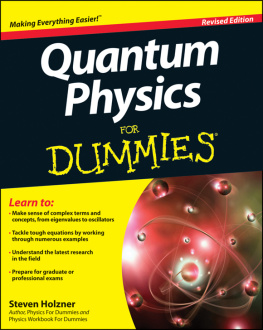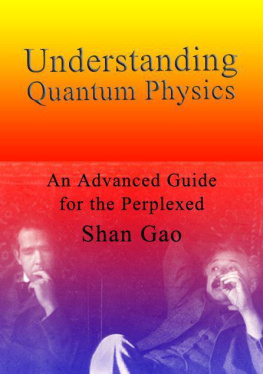ON PHYSICS AND PHILOSOPHY

ON PHYSICS AND PHILOSOPHY

Bernard dEspagnat
PRINCETON UNIVERSITY PRESS
PRINCETON AND OXFORD
COPYRIGHT 2006 BY PRINCETON UNIVERSITY PRESS
PUBLISHED BY PRINCETON UNIVERSITY PRESS, 41 WILLIAM STREET,
PRINCETON, NEW JERSEY 08540
IN THE UNITED KINGDOM: PRINCETON UNIVERSITY PRESS,
6 OXFORD STREET, WOODSTOCK, OXFORDSHIRE OX20 1TW
PRESS.PRINCETON.EDU
ORIGINALLY PUBLISHED IN FRENCH AS TRAIT DE PHYSIQUE ET DE
PHILOSOPHIE BY LIBRAIRIE ARTH`ME FAYARD, PARIS 2002
ALL RIGHTS RESERVED
FIRST PRINTING, 2006
EIGHTH PRINTING, AND FIRST PAPERBACK PRINTING, 2013
LIBRARY OF CONGRESS CONTROL NUMBER 2006926978
CLOTH ISBN 978-0-691-11964-9
PAPERBACK ISBN 978-0-691-15806-8
eISBN: 978-0-691-24023-7
BRITISH LIBRARY CATALOGING-IN-PUBLICATION DATA IS AVAILABLE
R0
PREFACE TO THE ENGLISH EDITION

T RYING TO UNDERSTAND what contemporary physics is truly about unavoidably raises philosophical problems. Such, anyhow, is the thesis that underlies the whole content of this book, the French edition of which came out just a few years ago. Since then, at least to my knowledge, no basically significant relevant material has appeared. For preparing this English edition only quite minor changes had therefore to be made. Practically all of them just came from the fact that I took the opportunity here to be more explicit in certain accounts and explanations, thus rendering this book clearer.
B. dEspagnat
ON PHYSICS AND PHILOSOPHY

FOREWORD

G REAT PHILOSOPHICAL riddles lie at the core of present-day physics and most people, by now, are aware of their existence even if but a few have a precise idea of their nature. The present book should, hopefully, make the issue clearer. But its ambition is, in fact, greater, for its aim is not merely to make these problems explicit. Nor is it just to try and relieve other physicists of conceptual perplexities liable to slow down the further elaborating of their discipline. Its more far-reaching purpose is to make it clear that, nowadays, any tentative philosophical approach to a world-view should take information coming from contemporary physics into account quite seriously. The book should make it manifest that, while, admittedly, philosophers have to go on pondering on the deep nature of knowledgefor such is their primordial rolestill they may not ground their systems just on their own cogitation. They have to consider what emerges from other sources. For example, it is sometimes claimed that any beginner in philosophy must, in a first approximation, choose to draw his or her inspiration from either Plato or Aristotle: an opinion that may sound acceptable. But the choice in question is often said to be fully arbitrary, to depend exclusively on the mental bent of the concerned individual. This is not really correct. Some elements of present-day scientific knowledge cast serious shadows on such and such Platonic intuitions, but they bring even more clearly to light the anthropocentrichence relativenature of the very notions that Aristotle and his followers got us into the habit of considering to be fully primary and basic. This of course should not remain without effect on the relative degrees of acceptance of these two thinkers positions.
To be sure, it might be objected that intrusion of science in the field of philosophy is presumptuous and inappropriate. And in support of this, some would pertinently point out that past scientific discoveries gave rise to simplistic extrapolations that are nowadays proved wrong. Admittedly, this is quite true. The risk that such a mishap should happen again is minimal, however, when (as is implicitly the case in the foregoing example) the information science yields serves to limit possible options, rather than put forward the allegedly correct one. And we shall find that in the philosophical realm such is indeed its major role. In fact, it is not inappropriate to consider that while Naturein the broadest possible senserefuses to explicitly tell us what she is, she sometimes condescends, when we press her tenaciously enough, to let us know a little about what she is not. Admittedly, it must be granted that, in the cases in which physics falsifies such and such views or shows them to be too naive, the arguments leading to these judgments are, more often than not, susceptible of being circumvented. But, as will appear in the book, this can only be at the price of shifting to theories that, for a host of good reasons, are considered by most physicists to be very likely untrue.
Unfortunately, the split that presently exists between scientists and philosophers means that many of the latter tend to simply ignore recent scientific advances, which makes them miss the point that, by blocking some traditional perspectives, such findings may well open promising new ones. For example, some philosophers do still make unrestricted use of classical notions of quite a general nature, such as locality, distinguishability, etc., taken to be obvious ever since Galileos and Newtons times. Most of them do so without realizing that the domains of validity of such notions are known, nowadays, to be severely limited. Ironically, some even condemnas unduly exploiting scientific dataany use made of the findings of such great twentieth-century physicists as Louis de Broglie, Dirac, Feynman, and Heisenberg. They thereby overlook the fact that the said findings are the very ones that invalidate unrestricted use of the classical notions in question and thereby open bright new fields for philosophical thinking. And more generally it is somewhat shocking to see conjectures that, daring as they are, still are in the wake of present-day knowledge being set on an equal footing with rash speculations resting on naive conceptions.
True, between science and philosophy a bridge theoretically exists. It is epistemology. Epistemology is a relatively young discipline. As a collective undertaking it has hardly been in existence for more than one century. It is meant to describe the ways in which the various sciences build up and test their theories. It tries and evaluates their logical and cognitive value, as well as the reliability of the validation processes they use. It questions the nature of the knowledge thus acquired, with the aim of determining in what sense it may be said to be true. These are important activities, which did yield quite significant results in many domains. On the other hand, the activities in question are of a very general nature. And this generality may bring about a misconception in that, in view of it, some epistemologists might consider that their enterprise, directed as it is at providing a suitable framework for research, should be carried over quite independently of the factual results of the latter. Now, it is true that sticking to such a conception may at first sight seem to be quite a reasonable standpoint. For indeed it enables the research workers who take it up to keep aloof from a certain instability that characterizes science proper and is an unavoidable consequence of its very development. Besides, it maybe added that the human mind, when confronted with multifarious and often rather technical data, has a natural tendency to consider that their very technicality restricts their bearing to details. And this opinion may well lead some to the reassuring view that just taking a rapid superficial glance at the technical data in question should be enough....




